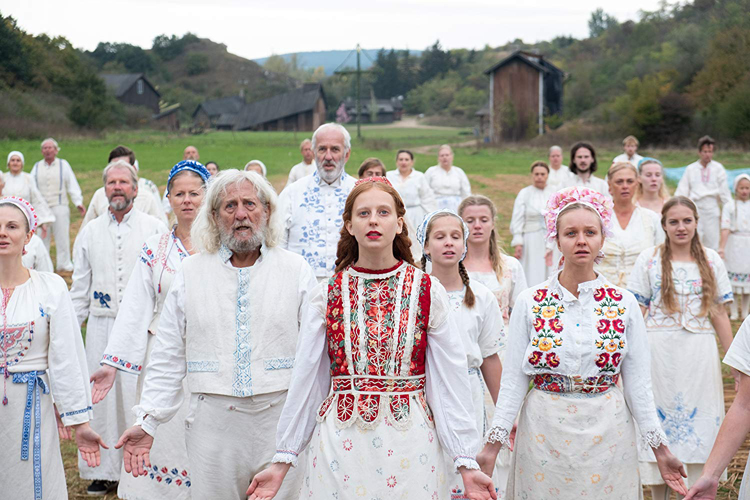After Ari Aster turned heads with Hereditary, his feature film debut, I sought out some of the short films he wrote and directed in his early career. One was Munchausen, which is about a mother who secretly poisons her son to prevent him from leaving for college. In a number of ways, Munchausen seemed like a thematic precursor to Hereditary: a grieving mother, an accidental death, the claustrophobia of a broken home. Another of Aster’s shorts was The Strange Thing About the Johnsons, wherein a young man rapes his father for years until the father gets hit by a car and the mother kills her son with a fire iron. Midsommar is more like that second short.
Apparently, Aster conceived The Strange Thing About the Johnsons after a discussion with his friends about cultural taboos. If that’s the case, he must’ve written Midsommar after researching taboos for a week straight without sleeping. Yes, his second feature has it all: incest, rape, suicide, euthanasia, human sacrifice, you name it—and it all goes down at a sunny Midsummer festival in Sweden.
That’s where Dani and Christian, a couple on the rocks, end up after Dani experiences a personal tragedy and decides to take some time away. She wasn’t originally supposed to come—her presence on the trip was the culmination of a chain of accidents—but before she knows it, she’s lounging in the Swedish countryside and accepting hallucinogenic drugs from strangers. That’s before all the cultish horror kicks in, of course.
Before you dash your hopes of ever visiting Sweden, you should know that the actual Midsummer festival has nothing to do with cultish horror. In reality, Swedish Midsummer started as a Christian holiday, championed by the church in an attempt to co-opt traditional pagan celebrations of the summer solstice. The festival embraces its roots by employing neopagan symbols, but historically, it has more in common with Christmas—the church hijacked the pagan winter solstice by claiming Jesus was born in December, and then morphed the pagan summer solstice into festivals for St. John the Baptist. Midsommar adds insult to injury by trading erasure for demonization: it goes the tired route of stereotyping someone else’s culture for scares and laughs.
And it definitely aims for both those things. Hereditary had some darkly comedic moments, but its defining feature was its ugliness—a purposeful ugliness that accentuated its central theme of grief. In Hereditary, what causes grief is ugly, and what grief can cause is uglier. There was no redemption from that corrosive cycle. Compared to its predecessor, Midsommar is a tonal mess: its taboo subjects can be ugly, yes, but they can also be… funny? Provocative? Ostentatiously intellectual? Think of Hereditary’s most shocking moment (you know the one), and then imagine it getting instant replays from different angles, trying to elicit different reactions. That’s what watching Midsommar feels like.
Mixing tones is a fine direction for horror movies—there are a number of great horror/comedies out there—but Midsommar’s recipe isn’t chewy and meaningful; it’s hard and callous. Hereditary may have been cruel, but its consistent cruelty found genuine horror in death and grief. By leaning further into gallows humor, Midsommar loses its balance: are pain and death horrible inevitabilities, or are they sources of comedic catharsis? The movie begs us to grieve for the trauma of some characters, but to laugh and jeer at the ones who “had it coming”. The inconsistency is inhumane.
Distracting us from Midsommar’s myriad problems are beautifully shot landscapes, evocative production design, and a tremendous performance from Florence Pugh, who clearly studied the depths of human sorrow in preparation for this role. The entire cast, down to the extras, is in great form. The cinematography, though, compounds the movie’s main flaws: the characters are typically shot from a distance, which widens the emotional distance between them and us. That would work if Midsommar were a straightforward slasher (which it was originally meant to be!) and identification with the characters was unnecessary, but mixed with Aster’s predilection for magnifying real-life pain, it’s more mean-spirited spirited than anything. Midsommar doesn’t build tension or even invoke fear well—it’s just ugly, and purposelessly so.
★★ (2/5)




